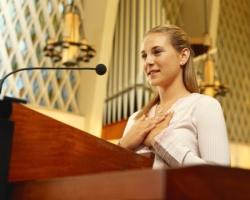It is interesting to see how power is a commodity that is very valuable in a church body. Everybody wants it, but very few know how to use it to leverage the mission of God within a given community. Instead, they use it to leverage a hidden agenda or program they want to see happen. If you really think about it, it almost mirrors what takes place in our government. Each person drives his or her agenda and has lobbyists to publicize and promote that agenda. All the while, a community and the world are dying apart from a relationship with Christ. A senior pastor told me once that if I did not learn how to navigate the politics of a local church I would not last long in ministry. I told him the day I got into politics in the church would be the day I found something else to do. I have not accepted a call to give my life to a set of political ideas or hidden agendas. I am called to take the gospel to the masses with no strings attached. I pray as I continue in ministry that the power plays that come along the way will reveal themselves and that I will be able to handle them with the grace and wisdom of Christ.
As leaders, we must have strategic purposes and invest in the people we lead, in turn creating future leaders. Jesus acted with a strategic purpose. He wanted to create a dynamic, multiplying movement capable of evangelizing the world. He chose to reveal the gospel first to the Jewish people. Many rejected Him, but there were some who embraced Him as Messiah. He used the Jewish disciples to help spread the gospel. Jesus had a heart for the Gentiles, as well. On several occasions during His earthly ministry, He reached out to Gentiles. From the woman at the well to the Roman centurion, He proved that the salvation He would bring through His death, burial and resurrection was for all people. Jesus chose to focus on a few believers and empower them to take His message and purpose to all the earth. He wanted to reproduce His character in them so they might be witnesses not only with their words, but also with their lives. He also wanted them to reproduce the structure He had established. Through the disciples, the church was formed. The church was to be structured so believers would be filled with Christ’s character.
Staffing must fit the church’s overall mission, and vision is key to having the right people on board for growth. In student ministry, it would benefit us to develop more into a multi-divisional model that allows more people to be involved in the leadership of the ministry. I would like for students to be more involved in leadership positions and take ownership of a particular ministry team that fits within their spiritual gifts and personalities. We all know of students who are a part of our student ministry who are not members of our churches. Their families don’t attend our churches. I would like to see a deacons and elders assigned to the unchurched students that doors might open for those families that that they might become involved in our churches. This would provide one more touch point for families to be connected to the church. Families often expect student pastors to contact them if their children are involved in minstry, but the more people who are involved in the life of a family, the more impact we can have on the spiritual development of that family.
A well-planned budget will allow the church to be a good steward of the money that its members give for the ongoing mission on a local body of believers. As ministers of the gospel, we are entrusted with the sacred duty of using the money given to God through the local body wisely. By planning, we can use those gifts to advance the gospel in the community and the world.
A student pastor must lead from the front and be the example of Christlike leadership within the student ministry and the church. Christianity is far more than a system to be taught or a set of teachings to believe. Luther believed the church wasn’t a place to participate in programs. He believed the community to be the church. Christike, compassionate life lived before those around us continues to perpetuate God’s transformational movement. Additionally, those we influence also sense the opportunity and commitment to pass on this legacy to the next generation because it has been engrained. They have been taught and mentored to know their gift to the next generation is the instilling of a Christlike way of life into their own children through their own model of Christ likeness.
Is a move of God such as this possible? I believe He wants to bring His body—His transformed followers of Christ—together in prayer, unity and the power of His Spirit to minister to the spiritual, physical and relational needs of others in a cradle-to-grave strategy. God has not called Christians to engage in a cultural war simply to protect and preserve a moral way of life. God has called us to be transforming salt and attractive light to the world; to bring hope and healing to a needy world. Jesus said our light is “like a city on a mountain, glowing in the night for all to see. Don’t hide your light under a basket! Instead, put it on a stand and let it shine for all. In the same way, let your good deeds shine out for all to see, so that everyone will praise your heavenly Father” (




